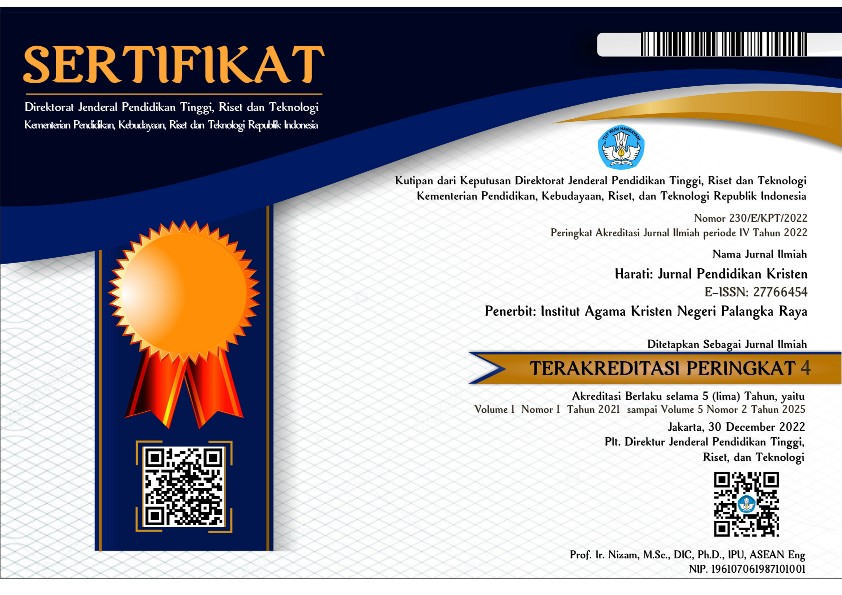Model Pendidikan Beyond the Wall dalam Pendidikan Agama Kristen dan Tantangan Kemajemukan Agama di Sekolah
DOI:
https://doi.org/10.54170/harati.v4i1.424Keywords:
beyond the wall, pluralism, Christian religious educationAbstract
This research intends to analyze the model of education beyond the wall in Christian religious education and the challenges of pluralism that exist in schools. The implementation of Christian religious education in schools is not easy. There are problems of religious pluralism faced by teachers and students in schools. For this reason, a special approach is needed to overcome these problems so that Christian religious education can achieve its goal of accepting pluralism as a gift from God. A qualitative method with a literature study approach was used in this research. The results show that the education model beyond the wall is an ideal model that should be developed into a contextualized pattern of religious teaching in schools. This model not only provides space for static dialogical relationships, but more than that, it invites students with various religious and ethnic backgrounds to work together to build peace and voice justice for the creation of a safe, peaceful and harmonious society.
References
Arifianto, Y.A. Kajian Multikultural dalam Bingkai Alkitabiah sebagai Kontribusi Membangun Komunikasi Antarumat Beragama. Prosiding Pelita Bangsa, (2): (2021).
Arifin, M., dan Abidin, Z. Harmoni dalam Perbedaan: Potret Relasi Muslim dan Kristen Pada Masyarakat Pedesaan. Jurnal FENOMENA, (16)1, (2017).
Bagaskara, “Menilik UU No 20 Tahun 2003 Tentang Sistem Pendidikan Indonesia,” Https://Mutucertification.Com/, last modified 2022, accessed November 25, 2023.
Cully, Iris V. Dinamika Pendidikan Kristen diterjemahkan oleh P. Siahaadan Stephen Sulaeman -cet. 18-Jakarta: Gunung Mulia 2019.
Eck, Diana L. Prospects for Pluralisme: Voice and Vision in the Study of Religion, Journal of the American Academy of Religion, (5) 4: (2017).
Effendi, Djohan. Pluralisme dan kebebasan Beragama. Yogyakarta: Interfidei, 2010.
Hasugian, Johanes Waldes, et al., “Panggilan Untuk Merekonstruksi Strategi Pendidikan Agama Kristen Yang Kontekstual Dan Inovatif,” Jurnal Shanan 6, no. 1 (2022).
Hermawati, R. Toleransi Antar Umat Beragama Di Kota Bandung. Indonesian Journal of Anthropology, (1)2: (2016).
Mukzizatin, S. Relasi Harmonis Antar Umat Beragama dalam Al-Qur’an. Andragogi Jurnal Diklat Teknis (7)1, (2019).
Nasikun. Sistem Sosial Indonesia. Jakarta: Rajawali Press, 2006.
Nuhamara, Daniel. Pendidikan Agama Kristen Remaja. Bandung: Jurnal Info Media, 2008.
Objantoro, E. Religious Pluralisme and Christian Responses. Evangelikal: Jurnal Teologi Injil dan Pembinaan Warga Jemaat (2)1, (2018).
Pius, A. P. dan M. Dahlan. Kamus Ilmiah Popular. Surabaya: Arkola, 1994.
Rosyid, M. Harmoni Kehidupan Sosial Beda Agama dan Aliran di Kudus. Jurnal ADDIN, (7)1: (2013).
Rumahuru, Y. Z. Keragaman Agama Sebagai Basis Pembelajaran PAK. Jurnal Mara Christy 5(2): (2014).
Rumahuru, Y. Z. Mengembangkan Pendidikan Agama Inklusif sebagai Solusi Pengelolaan Keragaman di Indonesia. Jurnal Teruna Bhakti, (1)1: (2018).
Saad, Ibrahim. Competing Identities in a Plural Society (Singapore: Institute of Southeast Asian Studies, 1981).
Sari, R. M. Keharmonisan dalam Kehidupan Umat beragama Perspektif Pendeta di Indonesia. JSA (4), (2020).
Shalahuddin, Marwan. Konservasi Budaya Lokal dalam Pembentukan Harmoni Sosial (Studi Kasus di Desa Klepu Sooko Ponorogo). Jurnal Multikultural & Multireligius Vol. IX No. 34, 65.
Zaiddin. Perspektif Islam dan Kristen Terhadap Multikulturisme. Al-Adyan: Journal of Religious Studies (1)2: (2020).







